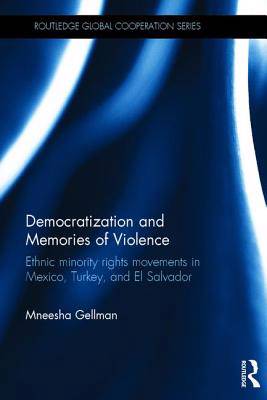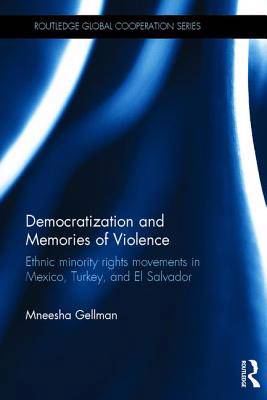
- Retrait gratuit dans votre magasin Club
- 7.000.000 titres dans notre catalogue
- Payer en toute sécurité
- Toujours un magasin près de chez vous
- Retrait gratuit dans votre magasin Club
- 7.000.0000 titres dans notre catalogue
- Payer en toute sécurité
- Toujours un magasin près de chez vous
Democratization and Memories of Violence
Ethnic Minority Rights Movements in Mexico, Turkey, and El Salvador
Mneesha GellmanDescription
Ethnic minority communities make claims for cultural rights from states in different ways depending on how governments include them in policies and practices of accommodation or assimilation. However, institutional explanations don't tell the whole story, as individuals and communities also protest, using emotionally compelling narratives about past wrongs to justify their claims for new rights protections.
Democratization and Memories of Violence: Ethnic minority rights movements in Mexico, Turkey, and El Salvador examines how ethnic minority communities use memories of state and paramilitary violence to shame states into cooperating with minority cultural agendas such as the right to mother tongue education. Shaming and claiming is a social movement tactic that binds historic violence to contemporary citizenship. Combining theory with empirics, the book accounts for how democratization shapes citizen experiences of interest representation and how memorialization processes challenge state regimes of forgetting at local, state, and international levels. Democratization and Memories of Violence draws on six case studies in Mexico, Turkey, and El Salvador to show how memory-based narratives serve as emotionally salient leverage for marginalized communities to facilitate state consideration of minority rights agendas.
This book will be of interest to postgraduates and researchers in comparative politics, development studies, sociology, international studies, peace and conflict studies and area studies.
Spécifications
Parties prenantes
- Auteur(s) :
- Editeur:
Contenu
- Nombre de pages :
- 242
- Langue:
- Anglais
- Collection :
Caractéristiques
- EAN:
- 9781138952683
- Date de parution :
- 17-08-16
- Format:
- Livre relié
- Format numérique:
- Genaaid
- Dimensions :
- 163 mm x 234 mm
- Poids :
- 453 g

Les avis
Nous publions uniquement les avis qui respectent les conditions requises. Consultez nos conditions pour les avis.






